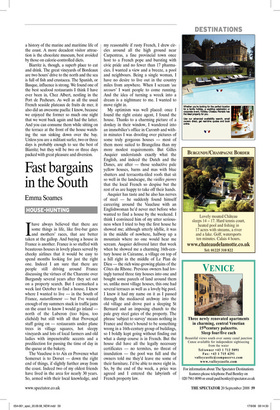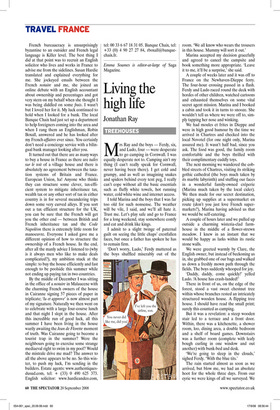Fast bargains in the South
Emma Soames
HOUSE-HUNTING Ihave always believed that there are some things in life, like five-bar gates and mothers’ races, that are better taken at the gallop. And buying a house in France is another. France is so stuffed with beauteous houses in lovely places served by cheeky airlines that it would be easy to spend months looking for just the right one. Indeed I am sure that there are people still driving around France discussing the virtues of the Charente over Burgundy several years after they set out on a property search. But I earmarked a week last October to find a house. I knew where I wanted to live — in the South of France, naturellement — but I’ve wasted enough of my summers stuck in traffic jams on the coast to know I would go inland — north of the Luberon (too bijou, too clichéd) but still with all that Provençal stuff going on — restaurants under plane trees in village squares, hot sleepy vineyards and lots of local farmers and old ladies with impenetrable accents and a predilection for passing the time of day in the queue at the bakery.
The Vaucluse is to Aix en Provence what Somerset is to Dorset — down the right end of things, if slightly further away from the coast. Indeed two of my oldest friends have lived in the area for nearly 30 years. So, armed with their local knowledge, and my reasonable if rusty French, I drew circles around all the high ground near Carpentras, a fine provincial town once host to a French pope and bursting with civic pride and no fewer than 17 pharmacies. I wanted a view and a breeze, a pool and neighbours. Being a single woman, I have no desire to live out in the country miles from anywhere. When I scream ‘au secours’ I want people to come running. And the idea of turning a wreck into a dream is a nightmare to me. I wanted to move right in.
My optimism was well placed: once I found the right estate agent, I found the house. Thanks to a charming picture of a donkey in their window, I wandered into an immobilier’s office in Caromb and within minutes I was drooling over pictures of some truly gorgeous houses — most of them more suited to Brangelina than my more modest requirements. But Gilles Auquier understands exactly what the English, and indeed the Dutch and the Danes, are after — those seductive pale yellow houses, barns and mas with blue shutters and terracotta-tiled roofs that sit so well in the landscape, the vieilles pierres that the local French so despise but the rest of us are happy to take off their hands.
Auquier has taste and he also has nerves of steel — he suddenly found himself careering around the Vaucluse with an Englishwoman he’d never met before who wanted to find a house by the weekend. I think I convinced him of my utter seriousness when I tried to buy the first house he showed me; although utterly idyllic, it was in the middle of nowhere, halfway up a mountain where no one would hear me scream. Auquier delivered later that week when he showed me a charming 16th-century house in Cairanne, a village on top of a hill right in the middle of Le Plan de Dieu — the rich wine-growing plains of the Côtes du Rhone. Previous owners had lovingly turned three tiny houses into one and bought some parcels of land around them so, unlike most village houses, this one had several terraces as well as a lovely big pool. I knew it had my name on it as I passed through the mediaeval archway into the old village and drove past a sleeping St Bernard and an imposing church to the pale grey steel gates of the property. The phrase ‘subject to survey’ means nothing in France and there’s bound to be something wrong in a 16th-century group of buildings, so I boldly kept going without finding out what a damp course is in French. But the house did have all the legally necessary certificates — no termites, no threat of inundation — the pool was full and the owners told me they’d leave me some of their furniture. I’d be able to move right in. So, by the end of the week, a price was agreed and I entered the labyrinth of French property law. French bureaucracy is unsurprisingly byzantine to an outsider and French legal language is Killer level. The best thing I did at that point was to recruit an English solicitor who lives and works in France to advise me from the sidelines. Susan Hardie translated and explained everything for me. She jockeyed emails between the French notaire and me, she joined an online debate with an English accountant about ownership and percentages and got very stern on my behalf when she thought I was being diddled on some frais. I wasn’t but I loved her for it. My luck continued to hold when I looked for a bank. The local Banque Chaix had just set up a department to help foreigners coming into the area and when I rang them an Englishman, Robin Boxall, answered and he has looked after my French affaires ever since. You certainly don’t need a concierge service with a bilingual bank manager looking after you.
It turned out that there are as many ways to buy a house in France as there are tuiles sur le toit of a village house and there is absolutely no agreement between the taxation systems of Britain and France. European Union, ha! Anyone who thinks they can structure some clever, tax-efficient system to mitigate inheritance tax, wealth tax or any other sort of tax in either country is in for several meandering trips down some very curved alleys. If you sort out a tax efficient structure for the UK, you can be sure that the French will get you the other end — between British and French inheritance tax and the Code Napoléon there is extremely little room for manoeuvre. Everyone I asked gave me a different opinion of how to structure the ownership of a French house. In the end, after all the manly advice I listened to (why is it always men who like to make deals complicated?), my ambition stuck at the simple: to buy the house efficiently and fast enough to be poolside this summer while not ending up paying tax in two countries.
By the middle of December I was sitting in the office of a notaire in Malaucene with the charming French owners of the house in Cairanne signing 57 pieces of paper in triplicate; ‘lu et approve’ is now almost part of my signature. Naturally we then went on to celebrate with a large four-course lunch and that night I slept in the house. After this incredible run of good luck, all this summer I have been living in the house warily awaiting the Jean de Florette moment of truth. Was Cairanne going to become a tourist trap in the summer? Were the neighbours going to exercise some strange mediaeval right to swim in my pool? Would the mistrale drive me mad? The answer to all the above appears to be no. So this winter, to push my luck, I’m sending in the builders. Estate agents: www.authentiquesdusud.com, tel: + (33) 0 490 625 373. English solicitor: www.hardieandco.com,











































































 Previous page
Previous page